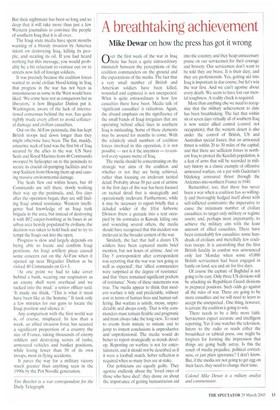A breathtaking achievement
Mike Dewar on how the press has got it wrong
O(Aver the first week of the war in Iraq there has been a quite extraordinary mismatch between the perceptions of the coalition commanders on the ground and the expectations of the media. The fact that a very small number of British and American soldiers have been killed, wounded and captured is not unexpected. What is quite extraordinary is how few casualties there have been. Media talk of 'significant casualties' is ridiculous. Again, the absurd emphasis on the significance of the small bands of Iraqi irregulars that are operating behind allied lines in southern Iraq is misleading. Some of these elements may be around for months to come. With the relatively small numbers of coalition forces involved in this operation, it is not possible nor is it the intention — to control every square metre of Iraq.
The media should be concentrating on the strategic war aims of the coalition and whether or not they are being achieved, rather than focusing on irrelevant tactical detail. Probably about 50 per cent of airtime in the first days of this war has been focused on tactical detail that is strategically and operationally irrelevant. Furthermore, while it may be necessary to report briefly that a deluded soldier of the 101st Airborne Division threw' a grenade into a tent occupied by his comrades in Kuwait, killing one and wounding several others, the media should have recognised that this incident was irrelevant in the broader context of the war.
Similarly, the fact that half a dozen US soldiers have been captured merits brief mention, but not hours of airtime. And on Day 5 correspondent after correspondent was reporting that the war was 'not going as well as expected', that 'allied commanders were surprised at the degree of resistance' and that 'there remained significant pockets of resistance'. None of these statements was true. The media appear to think that modern warfare is tidy and predictable, without cost in terms of human lives and human suffering. But warfare is untidy, messy, unpredictable and always costly. That is why com manders must remain flexible and pragmatic and must always take the long view. To react to events from minute to minute and to jump to instant conclusions is unproductive and unprofessional. The media would do better to report strategically as trends develop. Reporting on warfare is not for entertainment, and it should not be described as if it were a football match. Sober reflection is required when so many lives are at stake.
Our politicians are equally guilty. They agonise endlessly about the 'loved ones of those who have died'; they drone on about the importance of getting humanitarian aid into the country, and they heap unnecessary praise on our servicemen for their courage and bravery. Our servicemen don't want to be told they are brave. It is their duty. and they are professionals. Yes, getting aid into Iraq is important in due course, but let's win the war first. And we can't agonise about every death. We seem to have lost our mental toughness. A reality check is required.
More than anything else we need to recognise that the military achievement to date has been breathtaking. The fact that within six or seven days virtually all of southern Iraq is now under allied control (control, not occupation); that the western desert is also under the control of British, US and Australian special forces; that an armoured thrust is within 20 to 30 miles of the capital; and that there are sufficient forces in northern Iraq to protect the Kurdish population, is a feat of arms that will be recorded in military history as a classic example of offensive armoured warfare, on a par with Guderian's blitzkrieg armoured thrust through the Ardennes into northern France in 1940.
Remember, too, that there has never been a war when a coalition has so willingly and thoroughly hedged itself about with self-inflicted constraints: the imperative to cause the minimum number of civilian casualties; to target only military or regime assets; and, perhaps most importantly, to achieve the military aim with the least amount of allied casualties. There have been remarkably few casualties: some hundreds of civilians and mercifully few coalition troops. It is astonishing that the first British fatality in combat was announced only last Monday when some 45,000 British servicemen had been engaged in battle on land, sea and air for five days.
Of course the capture of Baghdad is not going to be easy. Only three US divisions will be attacking six Republican Guard divisions in prepared positions. Such odds go against all the rules of war. There are going to be more casualties and we will need to learn to accept the unexpected . One thing, however, is certain: the coalition is going to win.
There needs to be a little more faith. Servicemen expect accurate and intelligent reporting. Yet if one watches the television, listens to the radio or reads either the broadsheet or tabloid press, one might be forgiven for forming the impression that things are going badly astray. Is this the result of media prejudice, political correctness, or just plain ignorance? I don't know. But, if the media are not going to get egg on their faces, they need to change their tune.
Colonel Mike Dewar is a military analyst and commentator,








































































 Previous page
Previous page